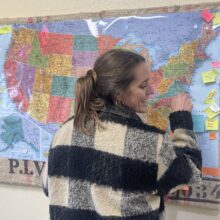According to a 2019 report from the U.S Small Business Administration (SBA), there were 30.7 million small businesses in the nation. Those businesses employed around 59.9 million people, or around 47.3% of the United States employees. In North Carolina, they reported about 1.7 million people were employed by a small business. The numbers below reflect a different reality in our current state, one prior to the COVID-19 pandemic.


The NC Rural Center and their advocacy branch, Rural Counts, are hosting a series of webinars entitled Rural Talk: A Virtual Advocacy Speaker Series, with different topics to engage rural leaders, around discussing strategies for moving forward. On Thursday, May 14, the conversation centered around rural entrepreneurship and small business development.
Panelists included José Alvarez of Prospera North Carolina, Talitha Batts of the policy center at The North Carolina Institute of Minority Economic Development, Jonathan Brereton of Thread Capital, and Matt Raker of Mountain BizWorks. At the end, two state legislators joined the call – Sen. Jay Chaudhuri, D-Wake, and Rep. Stephen Ross, R-Alamance.
The full webinar can be found below, and if you are interested in joining future conversations, sign up here.
Why should we care about small businesses?
This was the first questions posed by panel moderator, Kim Graham: “In a globalized world, where bigger is often celebrated as being better, why should we care about small businesses?”
Alvarez began by saying that “the engine of job creation in this country and communities is basically small businesses” and we need to make sure they have the right tools so they can grow and pay their dues. Batts agreed, and added that small businesses foster an interdependence that stimulates prosperity for local communities, keeping money close to home.
Brereton of Thread Capital emphasized that it isn’t just small businesses that matter, but new businesses as well.
“The creation of new enterprises is going to be pivotal to what the future looks like in North Carolina,” he said.
He went on later to touch upon the incentive programs that states create to bring new, big, out-of-state business into their areas. He suggests looking at taking those incentives and offering them to people in North Carolina that are starting new businesses.
“What would the return on that investment be, not just in jobs, but in establishing the state as a leader in entrepreneurship across the country?” Brereton said.
Graham said that 50% of businesses survive their first five years and asked the panelists to name key components to creating and sustaining small businesses. Collaboration and consistent availability of resources were reoccurring ideas heard throughout the webinar.
The need for collaboration between governmental agencies, nonprofits, foundations, and other organizations “can be messy,” as Raker said, but is vital to keep businesses afloat. Alvarez believes bringing people to work together is “building a muscle of assistance” for entrepreneurs.
Below are the resources mentioned during the webinar.
Foundation and resource list
Carolinas-Virginia Minority Supplier Development Council: CVMSDC promotes and facilitates business relationships between the public/private sector and certified minority-owned businesses.
Dogwood Health Trust: Works to dramatically improve the health and well-being of all people and communities of western North Carolina.
Golden Leaf Foundation: Works to increase economic opportunity in North Carolina’s rural and tobacco-dependent communities through leadership in grantmaking, collaboration, innovation, and stewardship as an independent and perpetual foundation.
Hispanic Contractors Association of North Carolina: Established to promote the long term success of Hispanic owned construction businesses in North Carolina and South Carolina.
Latin American Chamber of Commerce, Charlotte: The purpose of the Latin American Chamber of Commerce of Charlotte (LACCC) is to offer a sustainable bilingual platform of programs, events, and services that engages, empowers, and supports both Latino and non-Latino businesses, entrepreneurs, and professionals in order to accelerate their access to resource, growth and success.
LGBT Chamber of Commerce: The largest advocacy organization dedicated to expanding economic opportunities and advancements for LGBT people, and the exclusive certifying body for LGBT-owned businesses.
NC Rapid Recovery: In response to the unique economic challenges of COVID-19, a consortium of public, private, and nonprofit partners have come together and launched an innovative recovery-lending program to help support entrepreneurs and stabilize North Carolina’s small business sector.
Small Business Center Network: Local small business centers can provide you with a variety of helpful resources, including links to organizations and agencies vital to the successful operation of your business.
Small Business and Technology Development Center: Provides management counseling and educational services to small and mid-sized businesses. Most of their services are free of charge, and all are confidential.
Start Us Up: From the Ewing Marion Kaufman, America’s New Business Plan is a bipartisan policy roadmap to support entrepreneurs, with recommendations for federal, state, and local government. The plan was developed to provide policymakers with research-based solutions to overcoming the problems faced by entrepreneurs that prohibit them from starting and growing their business.
Women’s Business Center of North Carolina: The mission of the Women’s Business Center of North Carolina is to promote economic self-sufficiency for all women in North Carolina through entrepreneurship. They empower women by offering tools and support to establish businesses, stabilize their companies, generate sustainable profits, strategize for future growth and contribute to the growth and economic development of the community.
Urban League of Central Carolinas: ULCC’s mission is to equip African-Americans and all underserved communities with the tools to achieve social and economic equality.


